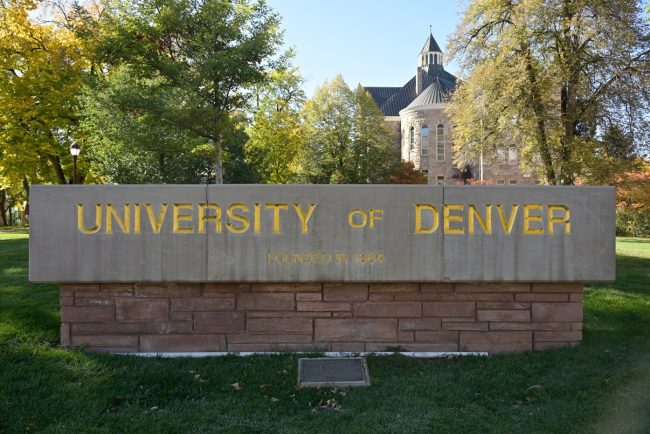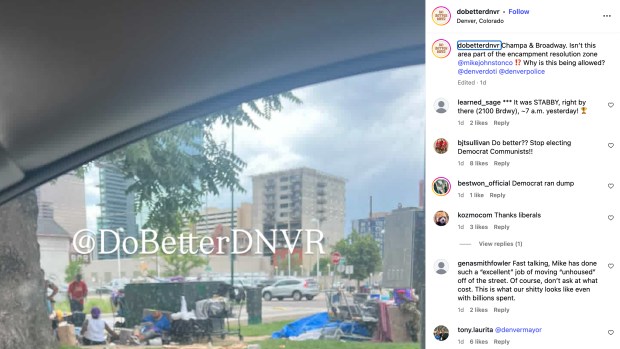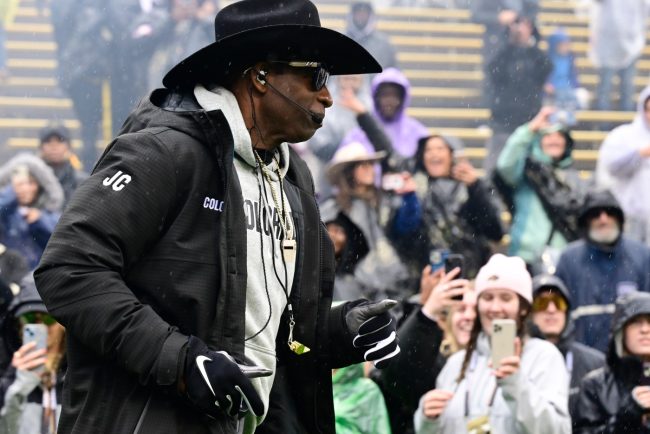
Aurora’s new shelter strikes the right balance between work-first and housing-first approaches (Opinion)
Homelessness is a national problem but at its core it is a local challenge, impacting cities all across the country. Here in Aurora, where I have led as the mayor for the last six years, the city and our nonprofit partner, Advance Pathways, have developed […]
Columnists
ICE is lawlessly detaining Coloradans. The judicial branch is our only hope (Editorial)
Federal immigration officials are out of control, and America’s third branch of government needs to rein in the gross abuse of power on display in Colorado and across the nation. Gregory Davies, a high-level federal official overseeing deportation arrests in Colorado, told a judge last […]
Opinion
Universities must change how they foster inclusiveness, DU has a plan to help everyone belong (Opinion)
There is no shortage of change taking place nationally in American education. We are witnessing shifts at universities and colleges across the nation in the efforts intended to help all students feel like they belong and are prepared to thrive. Perceptions that the work fostering […]
Columnists

My stillbirth blindsided me. Doctors and researchers can do better and Congress can help (Opinion)
My husband and I experienced an unimaginable loss when our son, Lucas, was stillborn seven years ago. On May 14, 2018, just a day after Mother’s Day, my husband and I went to the hospital. I was 39 weeks pregnant with our first child. With […]
ColumnistsMy husband and I experienced an unimaginable loss when our son, Lucas, was stillborn seven years ago.
On May 14, 2018, just a day after Mother’s Day, my husband and I went to the hospital. I was 39 weeks pregnant with our first child. With joy and anticipation, we were looking forward to meeting our son, Lucas. His name means “light,” because his arrival would light up our world.
Shortly after arriving at the hospital, I experienced a placental abruption — a serious condition where the placenta separates from the uterus, cutting off oxygen and nutrients to the baby. I nearly died and heartbreakingly, Lucas was stillborn.
Words cannot begin to convey the shock and anguish of losing a child in the final moments after a seemingly normal pregnancy. The light that once illuminated my world was suddenly extinguished, leaving me in the darkness of grief and depression.
The Centers for Disease Control and Prevention (CDC) defines stillbirth as the loss of a fetus after 20 weeks of pregnancy. Despite being well-educated, I mistakenly believed stillbirth was a thing of the past — something that only happened in places without proper nutrition or health care. No one warned me, and I naively assumed modern medicine had eliminated the risk, like that of malaria.
My personal loss was a harsh awakening, forcing me to confront the shocking reality of stillbirths in 21st-century America. The statistics are staggering: approximately 21,000 babies are stillborn in the U.S. each year, and around 2 million worldwide. Even more shocking is that nearly a quarter of them in the U.S. and about half of them worldwide are preventable.
Behind these staggering statistics are real people, some of whom I met at my local support group for grieving parents who had lost babies to stillbirth or shortly after birth. Like me, many mothers have experienced late-term stillbirths between 35 and 41 weeks. Some were never given explainations, only vague platitudes like “It happens sometimes” or “There was nothing we could do.”
Like me, some of these mothers were pregnant at an advanced maternal age (35 or older). Though research clearly links advanced maternal age to higher risks of stillbirth and placental abruption, many providers avoid discussing stillbirth to spare mothers’ anxiety, but this well-meaning silence has left many of us blindsided by the stillbirth of our babies.
Like me, some of these mothers were told it’s normal that babies move less as they “run out of room” late in pregnancy. Though research shows that a baby’s movement pattern may change late in pregnancy, it shouldn’t decrease. In the UK, where stillbirth rates have dropped, mothers are urged to contact their providers if they notice any change, especially decreased movement in fetal activity.
Despite being one of the most advanced countries in the world, the U.S. still has a higher stillbirth rate than many other developed nations. We must learn from countries that have made strides in reducing stillbirths. Some of their best practices include public awareness campaigns, and enhanced data collection.
Raising awareness is the first step to reducing stillbirths and saving lives. Health care providers must discuss stillbirth and prevention with expectant mothers, who in turn should advocate for themselves and their babies by asking questions and understanding the risks.
As grieving families, we can make a difference. By sharing our experiences through media, we can reach and inform more families. American families shouldn’t have to fight this alone. The U.S. Congress must prioritize stillbirth prevention by passing the SHINE for Autumn Act, which aims to improve data collection on stillbirths.
The legacy of our stillborn children should not be reduced to heart-rending statistics. Instead, it should inspire profound change to save lives so more babies will be born alive. Let Lucas’ light, and the light of all stillborn children, guide us toward that change.
Helen Raleigh is a Colorado-based entrepernuer, writer, and speaker. She’s the mother of Lucas (stillborn) and Allie (miscarriage).
Sign up for Sound Off to get a weekly roundup of our columns, editorials and more.
To send a letter to the editor about this article, submit online or check out our guidelines for how to submit by email or mail.

Climate disasters: Personal loss connects us all (Letters)
Climate disasters: Personal loss connects us all Re: “Healing power of storytelling,” August 3 commentary Years after the Marshall Fire, the embers of personal loss call out for remembrance. Listen also to the stories of those who endured the Guadalupe River flood in Texas Hill Country, […]
OpinionClimate disasters: Personal loss connects us all
Re: “Healing power of storytelling,” August 3 commentary
Years after the Marshall Fire, the embers of personal loss call out for remembrance. Listen also to the stories of those who endured the Guadalupe River flood in Texas Hill Country, the wildfires of Pasadena and Altadena, Calif., and the prolonged 100-degree heat of Phoenix.
One sentence in this report stood out to me: “Others mentioned the relevance of local stories as they apply to a global context of climate change.” We need more “others” to make that link to the cause of their personal loss to the ever-increasing floods, wildfires, and heat.
When the others become us, then we will see action. When climate change is perceived as a personal affront, along with the loss of Grandmother’s rings and pet turtles, then we will see action. When our personal stories become global stories, then we will see action.
Phil Nelson, Golden
DoBetterDNVR exposes the ugly truth
Re: “Who is the anonymous DoBetterDNVR?” August 3 news story
Your Sunday article is a blatant, misguided attack on the citizens documenting the unfortunate degradation of our once-lovely city. The reason DoBetterDNVR has struck a chord is that they’ve exposed the results of Denver City policies and the effects on the average residents of Denver.
I live in east Denver and work downtown. I often ride my bike to work on the Cherry Creek bike path and have seen the filthy growth along this corridor — increased homelessness, open drug use, loitering, and mid-day napping. This has resulted in a trashy and increasingly dangerous environment. For just our family, our home, garage, and car have been broken into in three separate incidents. My wife has had two instances of being threatened and accosted on the streets by crazed individuals. As a native Denverite, I’m concerned about the trajectory of our city. Where are we going to be ten years from now? Do you think that the citizens posting on DoBetterDNVR have a point? Why isn’t The Denver Post doing its job of reporting the effects of intolerable city policies?
Jerry McHugh Jr., Denver
Post right to hold DoBetterDNVR accountable
This was an incredibly brave act of journalism that your paper engaged in. People related to this organization have been incredibly toxic, and it’s good that we have people like you keeping them accountable. I just subscribed to The Denver Post today after hearing about this, and I plan to keep it renewed after the introductory rate is over.
Keep up the good work!
Standard Duong, Denver
Equal coverage doesn’t necessarily equal balance
Re: “Denver Post, consider some conservative leaders,” Aug. 3 letter to the editor
I try to consider rational ideas from a conservative point of view. I was a big fan of Barry Goldwater, “Mr. Conservative.” I met the man when my family lived in Phoenix. So I started to read the letter, hoping for some new insight. Until I encountered the phrase “second-rate politician.” Whatever a person has to say after that is irrelevant.
Neither Mr. Goldwater called, nor the Post’s own Krista Kafer calls, people names, because it kills one’s credibility.
Greg Albrecht, Aurora
To the letter writer: Just be patient. One day, newspaper coverage will be handled by AI, and The Denver Post and other major dailies will be able to provide an identical word count in both conservative articles and liberal articles.
But it won’t matter. Why? Because conservatives inherently distrust the media and see anyone with a journalist’s integrity as the enemy. Yes, integrity. I trust (the majority of) journalists more than my own mother.
Seeing it as it really is, without the blinders of the extraordinarily destructive beliefs and behaviors of the current administration, is, seemingly, an impossibility for the right. Naturally, when The Post, The New York Times, et al, point this out, it’s bias.
AI will take care of it. Heck, AI wrote this letter.
Craig Marshall Smith, Highlands Ranch
Championing the Pregnancy Resource Centers and the care they provide
Re: “Abortions are still available to Colorado patients with Medicaid,” Aug. 3 commentary
These physicians point out that abortion access in Colorado has not been affected by federal budget considerations. In fact, abortion access is free to both those privately insured and through our low-income Medicaid program. By free, I mean that our insurance premiums and our tax dollars pay for elective induced abortions in Colorado.
Sadly, the physicians don’t publicize the options for women who don’t choose to pursue abortion. Medicaid will continue to provide free prenatal care, birthing services, and post-partum care to enrolled women who continue their pregnancies. Unfortunately, for women who give birth and are privately insured, the cost of their pregnancy care can be in the thousands of dollars.
It is a shocking abdication of our state responsibilities to prefer one “choice” over another through selective insurance mandates. This is especially disturbing since we know that many women and their families report financial pressure to abort (see reference). A “choice” is only a choice if women feel they have more than one option.
Pregnancy Resource Centers (PRCs) provide millions of dollars of uncompensated care to women who choose to continue their pregnancies. It is a sad commentary that the Cobalt Abortion Fund is often cited in these pages, but references to the generous private funding from PRCs for women facing financial and social obstacles to childbirth are fastidiously omitted.
Tom Perille, Englewood
Dear Boomers,
I’m asking this on behalf of everyone born after 1965, particularly those in their 30s and 40s. Please downsize and sell your homes. Please sell your second homes to working families. Don’t continue to add to the housing inequality crisis. You are most likely still living in a large home, with lots of bedrooms and too many stairs. The majority of you have paid off your mortgages. If you’re over 60, most of you are decreasing your travel and home spending.
The current reality is this: Home prices have risen dramatically, outpacing inflation by a considerable margin. If home prices had only grown with inflation since 1970, the median home price today would be $177,788. Instead, the median home price in the United States is $462,000. According to U.S. Census data, the median income of families in 1970 was about $10,000. In 2023, it was about $78,000. This means the median home price is nearly six times the median income, while in 1970, the median home price of $23,400 was just over double the median income. This makes home ownership impossible for many working Americans.
You can flip the script. Sell your home for below market value, without a realtor commission, to a local family. Meet your buyer, and verify they will use it as their primary home. You will still take a healthy profit. Millions of younger Americans feel the American Dream is dead. But you can change the system. Flood the market with homes, do it in an ethical way, and give them the opportunity you had when you were young.
Sincerely,
Gen-X, Millennials, and Gen-Z
Abby Loberg, Granby
Seven ‘awestruck’ days in Colorado
I can barely imagine what it must have been like for the early explorers who came upon Colorado. Perhaps, they were as awestruck as I during my late July visit.
From our first lunch at the Wynkoop Brewing Company to our last lunch at Westbound and Down in Idaho Springs, our family spent seven enjoyable days in your state.
With Keystone as our base, we hiked, biked, fished, and learned about your priceless and precious land. Though altitude sickness wore on me, it didn’t keep me from admiring majestic mountains, forests thick with evergreens and aspens, wildflowers along the banks of creeks flowing with cold, clear water, and the unexpected sighting of moose.
One afternoon, we witnessed the extremes in Colorado weather. A furious hailstorm pounded on the Manitou and Pikes Peak Cog Railway as the train crept back down the famous peak.
No matter where we ventured — steep trails, rocky creeks, pristine lakes, and assorted retailers — we were met with friendly, patient people who were always willing to answer questions and provide guidance.
On our return from Pikes Peak into Keystone, we avoided the interstates. I will never forget the grand openness and splendor of endless pasturelands that unfolded along those back roads.
Zebulon Pike once said: “May Heaven be propitious, and smile on the cause of my country.”
I hope that heaven will be propitious and continue to smile on the people of Colorado with the will to persevere and preserve their irreplaceable land.
William Avery Pike Jr., Richmond, Va.
Sign up for Sound Off to get a weekly roundup of our columns, editorials and more.
To send a letter to the editor about this article, submit online or check out our guidelines for how to submit by email or mail.

Congress members should schedule real town halls, Colorado Rep. Boebert (Letters)
Schedule a real town hall, Rep. Boebert When we elect someone to represent us, we expect them to show up — not just in Washington, but here at home. With Congress on recess this month, our representatives should be holding real, in-person town halls. Not […]
OpinionSchedule a real town hall, Rep. Boebert
When we elect someone to represent us, we expect them to show up — not just in Washington, but here at home.
With Congress on recess this month, our representatives should be holding real, in-person town halls. Not tele-town halls where questions are screened and scripted. Not closed-door meetings with a select few. Real town halls where every voter has a chance to be heard, ask questions, and get straight answers.
Lately, it feels like too many politicians would rather hide behind press releases and social media posts than face their constituents directly. But public service isn’t supposed to be easy — it’s supposed to be accountable. That’s what town halls are for.
There are real issues facing our community that deserve open and honest discussion. We deserve to be part of that conversation, not shut out of it. I’m urging Lauren Boebert in Colorado District 4 to schedule and show up for a town hall this month.
Show up. Listen. Answer questions. That’s not too much to ask. That’s democracy. Do the job we hired you to do!
Joshua Richards, Castle Rock
Unannounced inspections: federal law for a reason
Re: “Questioning the purpose of Crow’s visit to ICE facility,” Aug. 7 letter to the editor
The letter writer apparently is not aware of the federal law that explicitly granted members of Congress the right to visit immigration detention facilities operated by or on behalf of the Department of Homeland Security (DHS) for the purpose of oversight. The Aurora ICE Detention Center is operated by GEO Group. This right includes unannounced visits, meaning that Congressional members are not required to provide prior notice to facility staff or DHS. Rep. Crow chose to visit on a Sunday without prior notice in order to see how the facility is operated when “guests” are not expected.
Harriet Mullaney, Denver
This is not big league baseball
Re: “Canada sigh: Gausman shines as Jays complete historically lopsided sweep,” Aug. 7 sports story
I supported Rockies interim manager Warren Schaeffer through thick and thin (mostly thin) this entire miserable season, but he blew it all to pieces when he inserted catcher Austin Nola to pitch the ninth inning of what ballooned from a 12-1 drubbing to a 20-1 destruction.
“What’s the harm in this?” you may ask. Well, first, there’s the increased possibility of injury — mostly to Rockies, but also to spectators — with balls being hammered hither and yon. Second, I paid $100 for nine innings of Major League Baseball; Nola is an MLB catcher, not pitcher. Third, and most egregious, the career statistics of every Rockie and Blue Jay will be forever warped by the insult of Schaeffer’s cynical ploy, which is beneath even Little League level. His managerial career should be terminated.
David E. Stauffer, Denver
What’s happening to the judiciary?
A judge is supposed to be unbiased, neutral and impartial when on the bench.
Their job is to read and understand the case. Then listen to any testimony, and then read the arguments for and against the issue at hand. Lastly, based on the law only, decide the outcome of the case.
This does not seem to be happening today in this country. It seems that oversight of the judiciary is now nonexistent and partisanship runs rampant. The judiciary is one-third of our government. If its neutrality and objectivity are gone, then the country is in danger.
Decisions should not be made by judges because they don’t like or believe in the issue, or because of gifts from friends or donors, or because they do not want to upset the guy or group that got them their job.
Candace Lehmann, Peyton
Sign up for Sound Off to get a weekly roundup of our columns, editorials and more.
To send a letter to the editor about this article, submit online or check out our guidelines for how to submit by email or mail.

Krista Kafer: Is DoBetterDNVR more anonymous troll or citizen journalist?
Back in high school newspaper class, we were taught that a news article included the who, what, where, when, and why of timely and consequential — newsworthy — events and trends. That’s exactly what Shelly Bradbury, crime reporter at The Denver Post, did in her […]
ColumnistsBack in high school newspaper class, we were taught that a news article included the who, what, where, when, and why of timely and consequential — newsworthy — events and trends. That’s exactly what Shelly Bradbury, crime reporter at The Denver Post, did in her recent article about DoBetterDNVR, an anonymous social media account that features videos of people behaving badly on Denver Metro streets.
She’s taking heat this week from DoBetterDNVR and its supporters for investigating the contributors and content of the controversial influencer that boasts more than 144,000 followers on Instagram and Twitter (now called X) and has caught the attention of city officials.
Rather than criticize a journalist for doing her job, DoBetterDNVR needs to do better.
If its administrator wants to be the “citizen journalist” he or she claims to be, then the social media organization must try to meet the same principles real journalists strive for: transparency, accuracy, and objectivity.
Many law-abiding Coloradans, including myself, frustrated by vagrancy, urban camping, vandalism, public nudity, theft, and open drug use appreciate DoBetterDNVR’s exposure of such lawless behavior and its support for “tough-love solutions” that discourage it. Ultimately, DoBetterDNVR will lend greater legitimacy to its efforts by rectifying the deficiencies brought to light by Bradbury’s article.

First off, just come clean. Journalists own their work. The names of reporters are in the byline. If an article is incorrect, the reporter must correct it and publicly acknowledge the error. Wrong often, they will lose their reputation and their job. Transparency is fundamental to accountability for journalists and opinion columnists like me. We must stand by our work.
The administrator of DoBetterDNVR should do the same, but thus far has opted for secrecy. Like most newspapers, The Denver Post requires that information be accurately attributed, rarely giving anonymity to sources and only as a last resort. Someone claiming to be the administrator of DoBetterDNVR called The Post but refused to identify his or herself or provide confirmation supporting that claim. Advised of the paper’s policy regarding attribution, the caller then refused to give an interview.
Other DoBetterDNVR contributors were found through their requests to city agencies under the Colorado Open Records Act and were contacted. They said they were not administrators, but confirmed they had contributed in the past as the article states. Two of the most frequent CORA requesters now live in other states. Is this relevant? Readers can decide. It is the reporter’s job to provide the information.
This isn’t doxing and DoBetterDNVR and its backers know it, their caterwauling notwithstanding. Doxing is the malicious exposure of a person’s address to enable potentially life-threatening harassment and abuse; naming names is investigative journalism. An organization that posts videos and photographs of people without their permission doesn’t have any room to complain about being identified. People who claim to be citizen journalists must stand by their work with a byline and endure the negative comments and threats that come with the job.
Such transparency helps uphold the second journalism standard — accuracy. As Bradbury’s article points out, DoBetterDNVR sometimes mixes facts with conjecture, rumor, and outright misinformation. Last year, for example, DoBetterDNVR posts claimed Denver police were too busy to back up Denver firefighters who were forced to engage with Venezuelan Tren de Aragua gang members at two apartment buildings. A city investigation found firefighters did not have such interactions with gang members and have received support from the Denver police in their operations.
Had this been a news article, it would have avoided speculation and provided sources to back up claims. Also, the inaccurate post would have been corrected or retracted, which it has not, at least at this writing.
Who is DoBetterDNVR? Meet 3 women feeding information to Denver’s loudest social media critic
/*! This file is auto-generated */!function(d,l){“use strict”;l.querySelector&&d.addEventListener&&”undefined”!=typeof URL&&(d.wp=d.wp||{},d.wp.receiveEmbedMessage||(d.wp.receiveEmbedMessage=function(e){var t=e.data;if((t||t.secret||t.message||t.value)&&!/[^a-zA-Z0-9]/.test(t.secret)){for(var s,r,n,a=l.querySelectorAll(‘iframe[data-secret=”‘+t.secret+'”]’),o=l.querySelectorAll(‘blockquote[data-secret=”‘+t.secret+'”]’),c=new RegExp(“^https?:$”,”i”),i=0;i<o.length;i++)o[i].style.display="none";for(i=0;i<a.length;i++)s=a[i],e.source===s.contentWindow&&(s.removeAttribute("style"),"height"===t.message?(1e3<(r=parseInt(t.value,10))?r=1e3:~~r<200&&(r=200),s.height=r):"link"===t.message&&(r=new URL(s.getAttribute("src")),n=new URL(t.value),c.test(n.protocol))&&n.host===r.host&&l.activeElement===s&&(d.top.location.href=t.value))}},d.addEventListener("message",d.wp.receiveEmbedMessage,!1),l.addEventListener("DOMContentLoaded",function(){for(var e,t,s=l.querySelectorAll("iframe.wp-embedded-content"),r=0;r<s.length;r++)(t=(e=s[r]).getAttribute("data-secret"))||(t=Math.random().toString(36).substring(2,12),e.src+="#?secret="+t,e.setAttribute("data-secret",t)),e.contentWindow.postMessage({message:"ready",secret:t},"*")},!1)))}(window,document);
Finally, if the administrator of DoBetterDNVR wants to be considered a journalist, he or she must strive for objectivity, instead of providing a single viewpoint on crime, vagrancy, and associated public policies. While pure objectivity is humanly impossible and journalists often reveal their bias in what they choose to cover, the prominence they give it (above the fold or page 20), who they interview, and the language they use, at least they strive to provide context and multiple viewpoints. Reporters avoid giving their opinion, unlike us columnists.
While no one is perfect, journalists try to capture the whole story. They also provide sources and double-check their facts, issuing corrections when found to be wrong. Journalists stand by their work by putting their name, reputation, and job on the line with every article.
Social media influencers need not even attempt to meet journalistic standards of objectivity, accuracy, and transparency. DoBetterDNVR can continue to be an anonymous site for videos of people behaving badly accompanied by opinion, humor, and semi-accurate information, or it can be journalism, but it can’t be both. If it chooses to be the former, then the administrator cannot grumble when a real journalist calls it out as such.
Krista Kafer is a Sunday columnist for The Denver Post.
Sign up for Sound Off to get a weekly roundup of our columns, editorials and more.
To send a letter to the editor about this article, submit online or check out our guidelines for how to submit by email or mail.

Of course, our thin-skinned president retaliates over unfavorable jobs report (Letters)
Thin-skinned president retaliates Re: “President blames poor jobs report on statistics chief, calls for her firing,” Aug. 2 news story I hope everyone appreciates the fact that we have a president who thinks he knows more about everything than anybody, no matter their level of […]
LettersThin-skinned president retaliates
Re: “President blames poor jobs report on statistics chief, calls for her firing,” Aug. 2 news story
I hope everyone appreciates the fact that we have a president who thinks he knows more about everything than anybody, no matter their level of expertise, and has no difficulty getting rid of anyone who doesn’t agree with him or provides information he doesn’t like.
If the director of the Bureau of Labor Statistics gives a poor job report, she’s fired. Of course, as a Biden appointee, it was regarded as a political ploy to make him and the Republicans look bad, since well, the president is perfect in all things. Never mind that the U.S. government’s data has been considered the “gold standard” of economic measurement globally, and economists and Wall Street investors have long considered these findings valid for decades.
We must understand that everything that is in any way critical of the Trump administration is portrayed as politically motivated, and/or is just plain wrong, and must be corrected by hiring the right people to recognize that Trump is always and consistently right … about everything. We’re so fortunate that we don’t have to waste our time thinking for ourselves.
Cindy Clearman, Arvada
Questioning the purpose of Crow’s visit
Re: “Crow, Neguse sue ICE over lack of access to facilities,” July 31 news story
Recently, U.S. Rep. Jason Crow attempted an unannounced visit to the Aurora ICE facility on a Sunday. He wanted to make sure the illegal immigrants had proper care. He was denied entrance. ICE has a 72-hour notice, but Crow’s law says that the representatives can show up unannounced. Shortly after this occurred, Crow filed a lawsuit against the Trump administration. Was this his real purpose? Who is going to pay for the lawsuit and its defense? Is it us, the taxpayers? It has been well said that “lawsuits spring up like poisonous weeds in a plowed field.”
Dianne Moyers, Centennial
Leaders should uphold the freedoms we fought for
As a proud veteran of the United States military, I pledged to defend our nation’s freedoms — an oath that does not expire with military service. I am compelled to voice my concerns over President Donald Trump’s presidency, which threatens the democratic values I swore to protect.
Trump’s presidency is marked by division, as he routinely uses fear to pit Americans against one another. His disrespect for troops and veterans is well-documented, from disparaging fallen heroes to advocating policies that harm military families. Finally, his continued disregard for the rule of law by ignoring court orders, the constitution of our country, and deploying U.S. troops against our own citizens.
Veterans understand the weight of our duty: to defend America against all threats to our democracy. Trump’s actions and words have demonstrated that he will abuse his power for personal gain and take away the basic freedoms we served to protect.
Let us honor our service by supporting a future that upholds the freedoms we fought for. We need leaders who respect our institutions, who unite rather than divide, and who truly value the sacrifices of those who serve.
Patrick Lagutaris, Boulder
Sign up for Sound Off to get a weekly roundup of our columns, editorials and more.
To send a letter to the editor about this article, submit online or check out our guidelines for how to submit by email or mail.

Ghislaine Maxwell prison upgrade: Silence from those who bought into “Pizzagate” (Letters)
Silence from those who bought into ‘Pizzagate’ Re: “Maxwell transferred to prison camp in Texas,” Aug. 2 news story Remember when MAGA was horrified and ready to storm the pizza shop because of a supposed Democratic pedophile ring in the basement? And, without a shred […]
LettersSilence from those who bought into ‘Pizzagate’
Re: “Maxwell transferred to prison camp in Texas,” Aug. 2 news story
Remember when MAGA was horrified and ready to storm the pizza shop because of a supposed Democratic pedophile ring in the basement? And, without a shred of evidence in any form? Where is their outrage when President Donald Trump is allowing his administration to move Ghislaine Maxwell, an actual convicted pedophile on multiple accounts, with tons of actual evidence to prove her guilt, from one low-security facility to an even lower-security location? And the president “wishes her well?” Aren’t they at least curious as to why his administration is involved at all?
And while I’m thinking about it, why aren’t Republican officials outraged and trying to stop the move? Or are they too busy figuring out how to gerrymander their district before the next election?
Come on, people. Get registered and vote so we can work to restore a decent democracy in our government.
Jim Cronin, Commerce City
Speedy bikers should show some courtesy
I’ve been riding the Denver bike paths for many years. And bikers “in the good old days” were respectful of fellow bikers. Everyone hollered “on your left” as they passed slower bikers. Or, just as good, they rang their bells. So we riders being passed knew they were coming and maintained our path.
That has changed. Most bikers on the Cherry Creek Trail and the South Platte River Trail say nothing. They go flying by. Today, three bikers on each other’s tail did that. A couple of weeks ago, I was going one way on the path, and another lady was going the other way. As we were passing each other, a biker rode right between us.
And, of course, the scooter riders have no idea how to be safe. They, too, come up behind and zip by.
What is so darn difficult about saying “on your left?” Why did that stop? Unfortunately, I have to say I’m getting scared of riding the bike paths. Come on, fellow bikers, let us slower riders know when we’re going to be passed.
Sherry Richardson, Denver
Federal relief funding for adult education arrives, but the fight isn’t over
The recent release of long-delayed federal funds for adult education programs in Colorado and across the nation is a welcome relief, but it’s not enough. This temporary fix does nothing to resolve the chronic underfunding and instability that plagues these programs year after year.
Adult education serves millions of Americans annually — low-income individuals, legal immigrants working to improve their English, formerly incarcerated people rebuilding their lives, and single parents seeking a better future for their families. These learners work hard to break the cycle of poverty and dependency.
While the U.S. spends around $10,000 per elementary school student, these adult learners receive just $583 a year, according to the Coalition on Adult Basic Education. Just 100 hours of instruction can boost annual income by nearly $10,000. Nearly half of GED recipients pursue higher education.
This success is powered by underpaid educators, many of whom take multiple jobs, manage several centers, and work without benefits. Their commitment keeps the system running against the odds. Adult education isn’t charity, it’s a smart, high-return investment.
Lawmakers from both parties helped secure this year’s delayed funding, but next year’s budget already threatens cuts. Programs in Colorado and beyond have faced furloughs and closures. Without stable, adequate funding, we risk losing everything these programs have built.
Now is the time for Congress to secure long-term funding for adult education.
Sharon Bonney, Denver
Editor’s note: Bonney is the CEO of the Coalition on Adult Basic Education.
Sign up for Sound Off to get a weekly roundup of our columns, editorials and more.
To send a letter to the editor about this article, submit online or check out our guidelines for how to submit by email or mail.

Tax breaks for the rich have negative impact on housing market (Letters)
Tax breaks for the rich have negative impact on housing market Re: “Investors snap up growing share of homes,” July 9 news story The rich have so much money that they don’t know what to do with it. So they invest in the stock market […]
LettersTax breaks for the rich have negative impact on housing market
Re: “Investors snap up growing share of homes,” July 9 news story
The rich have so much money that they don’t know what to do with it. So they invest in the stock market and drive stocks to new records almost weekly.
The other popular investments are in real estate. Your article on investors snapping up nearly 27% of all homes comes as no surprise. There is no housing shortage. There are vacant houses all over. The house next door to me is owned by an investor and has been vacant for at least seven years.
The rich can pay cash and don’t worry about interest rates. President Donald Trump’s tax breaks are a major factor in our homelessness. I’m still waiting for someone to explain why the rich need more money and the poor don’t need health insurance.
Rod McCabe, Buena Vista
Rep. Boebert, ‘this is not freedom’
With her recent vote for the One Big Beautiful Bill, Rep. Lauren Boebert has shown voters in her district her views. Our health and safety are not a priority with her. The Big Beautiful Bill will cut Medicaid to millions of needy folks as well as cut SNAP (food stamps) to thousands or perhaps over a million as well.
Her priority is to help the rich and hurt the middle and lower classes in need. She says her job is to keep us free. There are a lot of definitions of what that means. In her case, I guess I would assume she includes free to die of medical issues after taking away our insurance, free to starve and possibly die from lack of food, especially small children.
Then there is her ignoring climate change, so we are free to increase the risk of losing our homes, businesses, or lives like the children in Texas. Her “freedom” vote is especially scary for the rural areas and the risk of rural hospitals closing down.
This is not freedom.
Wayne Wathen, Centennial
Medical aid-in-dying is the right option for many
Re: “Disability rights groups sue over aid-in-dying law,” July 1 news story
Four disability rights organizations and the woman who filed a complaint in U.S. District Court against Colorado’s medical assistance in dying (MAID) need to have a conversation with those who are choosing the system.
The woman I was dating was diagnosed with ALS and did not want to suffer the indignities of hospice workers or family members changing her diapers. Having lost her voice and her swallowing ability, she relied on her ability to type messages while a plastic bag dripped food into her feeding tube. As she lost manual dexterity, and as her balance declined, she became worried she would no longer be able to share her thoughts and needs, with only decline on the horizon. Also, she was deeply worried she would fall and break a hip or have a concussion. With bravery, she chose to end her life.
In the week before, her family and friends gathered nightly around her dining room table. She heard the eulogies that were to be delivered at her funeral. On the day she took the medicine, the love of family members and friends engulfed her as they sat with her in the room. It was the most beautiful send-off one could imagine.
No amount of counseling could have convinced her to extend her life because there was no hope of recovery. She died with dignity. Government must not take away our right to choose the time and manner of our death, nor undo years of effort to secure MAID.
Daniel A. Roberts, Denver
Sign up for Sound Off to get a weekly roundup of our columns, editorials and more.
To send a letter to the editor about this article, submit online or check out our guidelines for how to submit by email or mail.

Trump gives coal a boost, guts renewables and will return haze to the Four Corners (Opinion)
A few years back, my friend Norm told me that when he was growing up in northern New Mexico in the 1950s and early ‘60s, his family often drove up to the La Plata Mountains in southwestern Colorado. From there he could see all the […]
ColumnistsA few years back, my friend Norm told me that when he was growing up in northern New Mexico in the 1950s and early ‘60s, his family often drove up to the La Plata Mountains in southwestern Colorado. From there he could see all the way to the Sandia Mountains outside Albuquerque, some 200 miles away.
His statement saddened me, since in all the time I spent on Four Corners high points, a persistent haze always limited my visibility to maybe 50 or 60 miles, blurring Shiprock’s sharp spires into a fuzzy silhouette. That’s because a fleet of massive coal-fired power plants in the region churned out haze-producing pollutants, harming humans and the ecology and blotting out vistas from the San Juans to the Sandias. It seemed as if I’d never get a view as clear as Norm’s.
But over the last decade, the failing economics of coal and clean air regulations shuttered those power plants. That means the air on the Colorado Plateau — when not sullied by the ever-lengthening wildfire season — has become cleaner as the coal industry faded away.
The shuttered plants include Mojave, Navajo, Nucla, Escalante, San Juan and, most recently, Cholla. The closures certainly sharpened the view of folks all over the region. But more importantly, they kept tens of millions of tons of greenhouse gases out of the atmosphere and oodles of harmful pollutants (arsenic, mercury, sulfur dioxide and soot) out of the lungs of nearby residents, many of them on the Navajo Nation.
Yet in defiance of the free market that has boosted renewables, the Trump administration is acting to undo those positive changes and make the air dirty again by throwing multiple lifelines to the flagging coal industry.
It has eviscerated environmental protections limiting mercury and other toxic air emissions, ended Obama-and Biden-era freezes on new federal coal leases, and rescinded limits on carbon dioxide emissions. The administration has also blocked utilities from shutting down plants that are old, dirty and more costly than other power sources.
Trump purports to do this in the name of “unleashing” coal from regulatory constraints so it can be mined and burned to achieve American “energy dominance.” Yet it’s unlikely that unleashing the industry will reverse its decline.
It’s true that delaying implementation of the mercury rule will enable the Colstrip coal plant in Montana — one of the nation’s dirtiest facilities — to continue operating without expensive new pollution control equipment. Generally, though, utilities such as Xcel Energy, Intermountain Power Agency and Tri-State Generation & Transmission are moving forward with plans to retire their coal plants, namely because the aging facilities are dirty, inefficient, inflexible and, most of all, no longer profitable. They just can’t compete with natural gas, solar, wind, and other, cleaner energy sources.
When signing one of his fossil-fuel-friendly orders, Trump said he would “save” the Cholla coal plant near Holbrook, Arizona, from destruction, adding, “We’re going to have that plant opening and burning the clean coal, beautiful clean coal, in a very short period of time.”
But its operator, Arizona Public Service, said it had already procured cleaner, cheaper generation for the plant, and had no desire to keep burning coal at Cholla. There was no save needed.
If Trump were truly interested in energy dominance and abundance, he would have supported the fastest-growing energy sources — wind and solar power. Instead, his administration is doing all it can to stifle them, from eliminating production tax credits for renewable energy in his “big, beautiful” budget bill, to slowing down permits for clean energy developments on public lands. Both utility-scale and rooftop solar will be affected, boosting the prospects of oil and gas, coal and nuclear.
U.S. Energy Secretary Chris Wright, in an Economist column, revealed the philosophy behind the administration’s fossil-fuel fetishization. He wrote that climate change is “not an existential crisis,” merely a “byproduct of progress.” He said he was willing to take the “modest negative trade-off” of climate change — along, presumably, with ever more devastating heat waves, wildfires and floods— “for this legacy of human advancement.”
He is probably correct in saying that climate change and the sullied air over the Colorado Plateau are byproducts of so-called progress. But they are also nasty, deadly and avoidable. Ultimately, going backward toward coal will not only wreck progress, but perhaps life on earth as we know it.
Jonathan Thompson is a contributor to Writers on the Range, writersontherange.org, an independent nonprofit dedicated to spurring lively conversation about the West. He has long covered the West’s natural resources.
Sign up for Sound Off to get a weekly roundup of our columns, editorials and more.
To send a letter to the editor about this article, submit online or check out our guidelines for how to submit by email or mail.

Despite Trump’s Planned Parenthood penalty, abortions are still available to Colorado patients with Medicaid (Opinion)
First things first: You can get an abortion in Colorado, whether procedural or medication abortion. If you are on Medicaid, you can still get an abortion in Colorado. Individual providers can still provide abortion care to people who need it, regardless of whether they have public […]
ColumnistsFirst things first: You can get an abortion in Colorado, whether procedural or medication abortion. If you are on Medicaid, you can still get an abortion in Colorado. Individual providers can still provide abortion care to people who need it, regardless of whether they have public or private insurance. And if you have a problem paying for your abortion, please reach out to the Cobalt Abortion Fund for help.
What’s happening to Planned Parenthood is terrible, it’s very real, and it is hurting access to abortion care in Colorado. Planned Parenthood was targeted by President Donald Trump’s budget bill, just as they have been for years, and their patients are paying the price. The chaos is intentional: health care providers are scrambling to adapt to the latest court rulings, patients are seeing their appointments cancelled, rescheduled, and moved around, and nobody has a clear idea of what’s next.
The recent federal budget bill, which should be called the Forced Birth Bill, penalizes Planned Parenthood not only for offering abortion services but also for providing comprehensive reproductive health care, including STI testing and contraception. It is a direct attack on bodily autonomy and the right to control a person’s own body, their reproductive health and freedom, and their social, economic, and political power.
The bill imposes a punitive one-year ban on Planned Parenthood for offering these services, preventing them from receiving federal Medicaid funding during that period. The result has been a denial of basic health care to people most in need of it, and a denial of control, dignity and self-determination.
As current and former providers, we are feeling the attacks ourselves, just as we did in those terrible days right after the Dobbs decision. The deliberate trauma hurts everyone. And it has again created a crisis of care here in a state where abortion is protected both in law and in the state Constitution with Amendment 79.
It’s important to understand Amendment 79 is not nullified by the federal bill. Instead, it becomes even more vital, making it more important to ensure Coloradans’ guaranteed access to abortion care. Coloradans have a constitutional right to access abortion under Amendment 79. But now, thanks to Trump’s budget bill, Coloradans are being forced to navigate a system that delays, deflects, and denies.
Reproductive freedom is not a theoretical policy value. It’s a lived need. We have heard that need every day, from Colorado patients and those fleeing abortion bans in other states. It’s one that fundamentally affects the present and the future of our patients.
We are under no illusions that as abortion providers we are all under threat and that abortion opponents will come for us, too. The goal has always been to ban abortion, whether it’s by explicit legislative dictate or by making it impossible to provide care by burying patients and providers both in a pile of confusion and red tape.
The crisis for Planned Parenthood is not just a political issue. It directly impacts some of the most at-risk people and populations in Colorado and across the nation. It’s a racial and economic justice issue, and our communities deserve better.
The bottom line is that people with abortion care appointments with individual providers should keep them. Those needing appointments should make them. And those who need procedural or practical support can reach out to the Cobalt Abortion Fund for help.
We don’t know what’s next. But we stand in solidarity with our colleagues at Planned Parenthood, and to anyone who comes to us in need of abortion care.
Don Aptekar is a retired ObGyn who served patients in Colorado for 50 years. Kara Alexandrovic is a practicing ObGyn in the Denver Metro area.
Sign up for Sound Off to get a weekly roundup of our columns, editorials and more.
To send a letter to the editor about this article, submit online or check out our guidelines for how to submit by email or mail.

College sports is now the Wild West, a frontier of chaos and opportunity (Opinion)
University sports, have long been a field of passion, competition, and intense loyalty. Yet beneath the surface of packed stadiums and thrilling games lies a chaotic, poorly regulated, and rapidly evolving landscape that closely resembles the Wild West of the 19th century. This comparison is […]
ColumnistsUniversity sports, have long been a field of passion, competition, and intense loyalty. Yet beneath the surface of packed stadiums and thrilling games lies a chaotic, poorly regulated, and rapidly evolving landscape that closely resembles the Wild West of the 19th century. This comparison is not merely insightful; it highlights deep issues around governance, money, power, and freedom that define the current state of college sports.
The Wild West was known for its absence of centralized authority, where law enforcement was sparse and rules were often made or broken on the spot. Similarly, today, college athletics operates in a murky zone, where governance is fragmented and enforcement is inconsistent.
The NCAA has traditionally been the main regulatory body, but its rules are often outdated, contradictory, and selectively enforced. Recent developments, including Supreme Court decisions, have complicated the regulatory environment. Schools, conferences, and even states are creating their own rules, leading to a patchwork system with little national uniformity.
Like the Wild West, this regulatory confusion creates opportunities for exploitation and controversy. Some schools and athletes benefit from loopholes and aggressive interpretations of these guidelines, while others are penalized inconsistently. The lack of clear, enforceable rules creates turf wars among schools, agents, and sponsors, all competing for advantage.
The Wild West was fueled by the gold rush — a frenzy for wealth that attracted prospectors, businessmen, and opportunists. College athletics today is driven by a similar rush for revenue and influence.
Major college sports, especially football and basketball, generate billions of dollars annually through media agreements, merchandising, institutional support, student fees, ticket sales, booster donations and sponsorships. Universities see athletics as a lucrative branding and fundraising tool, while coaches command multimillion-dollar salaries: some over $10 million annually.
This gold rush creates intense competition and sometimes ruthless behavior. Schools invest heavily in facilities, direct compensation to athletes, and recruiting to gain a competitive edge. Coaches and agents maneuver aggressively to secure top talent. Young athletes must navigate complex contracts with little or no legal and financial advice.
In today’s sports environment, ethical boundaries can be unclear or ignored, reminiscent of the lawlessness and opportunism of the Wild West. Scandals involving recruiting violations, tampering with other school’s players, academic deception, and dishonest compensation are common, and the stakes have never been higher.
The Wild West was a place of both opportunity and danger, where settlers could build new lives but faced unpredictable threats. College athletes today inhabit a similar frontier.
For many players, college sports offer a chance to showcase their talents, earn scholarships, earn million-dollar direct compensation and potentially launch professional careers. Recent court decisions have opened new territory for athletes to monetize their fame while still in school, and generous transfer policies are a revolutionary shift from previous eras.

Arch Manning has a name, image and likeness valuation of an estimated $6.8 million. The Texas Longhorns’ quarterback signed a deal with Red Bull in January and has a company peddling autographs on his behalf. Carson Beck who is now with the University of Miami after using the transfer portal to leave Georgia, is valued at $4.3 million, and Jeremiah Smith, studying at Ohio State University, is a close third in the league, worth an esitmated $4.2 million.
However, these opportunities come with serious risks. Many athletes face intense pressure to perform while balancing academics and their personal lives. Injuries can end careers abruptly. Athletes can suffer Long-term health impacts, particularly in football, where repeated hits can lead to chronic traumatic encephalopathy (CTE) later in life. The lack of comprehensive protections and support systems for athletes echoes the Wild West’s perilous landscape, where pioneers often had to fend for themselves amid uncertainty and danger.
In the Wild West, mavericks, often rebellious individuals — played enormous roles. Today’s college athletics landscape features similar figures: Deion Sanders (University of Colorado) is known for his charismatic personality, unique recruiting style, and emphasis on culture change; Mario Cristobal (University of Miami) is an aggressive recruiter with a brash style, known for his strong emphasis on physicality and toughness; and Brent Venables (University of Oklahoma) is a defensive mastermind bringing innovative schemes and a fiery coaching demeanor.
With the recent emergence of mandated pay-for-play, individual athletes have become entrepreneurs. They also have the autonomy to sign endorsement contracts for their personal brands in ways previously unimaginable. Meanwhile, independent sports agents, coaches, and marketing firms aggressively recruit talent, sometimes clashing with schools and the NCAA.
Boosters and donors also act as powerful, sometimes shadowy players. Their financial support can sway recruiting and program decisions.
The Wild West was often tainted by territorial disputes and rivalries, often settled through showdowns or alliances. College athletics mirrors this dynamic through intense rivalries not just on the field but in recruitment, conference realignment, and media markets.
Schools compete fiercely to sign top recruits, sometimes engaging in unethical gray areas. Conferences are reshaping themselves based on media revenue, streaming platforms potential, rather than geography, game start times or tradition, leading to shifting allegiances and tensions.
These turf wars create a volatile environment where alliances can shift quickly, power balances change, and uncertainty reigns.
College athletics is undeniably a modern-day Wild West — a frontier of opportunity, risk, money, and power, shaped by fragmented rules and fierce competition. Like the frontier towns of old, it is a place where fortunes can be made or lost, where law and order struggle to keep pace with rapid change, and where students navigate a complex landscape of alliances and rivalries.
Understanding college athletics through this lens helps explain its current challenges and the urgent need for reform. Clearer regulation, better protections for athletes, transparency in financial dealings, and a balanced approach to governance could help tame this wild frontier.
Until then, college sports will remain a thrilling yet unpredictable field — where legends are made, fortunes are chased, dreams are lost and the spirit of the Wild West lives on.
The wild, wild West often occurred when there was no sheriff in town.
College sports now more than ever needs a modern-day sheriff to supervise present outlaws like Billy the Kid and pioneers like Buffalo Bill.
Jim Martin was an adjunct professor who taught Sports Law at CU and DU-chaired the University of Colorado committee on athletics for many years and has a passion for public speaking engagements. He can be reached at jimmartinesq@gmail.com.
Sign up for Sound Off to get a weekly roundup of our columns, editorials and more.
To send a letter to the editor about this article, submit online or check out our guidelines for how to submit by email or mail.


